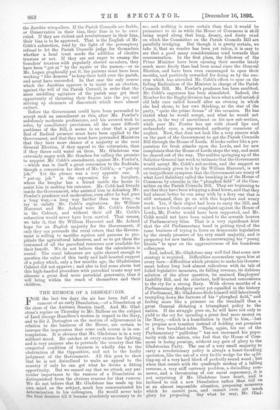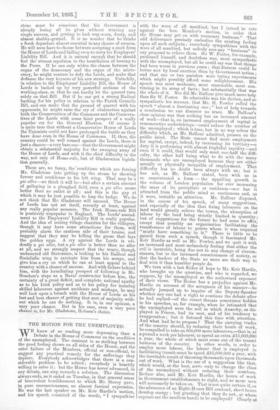THE RUMOUR OF A DISSOLU lION. F OR the last ten
days the air has been full of a rumour of an early Dissolution,—of a Dissolution at the close of the Autumn. Session itself. And Mr. Glad- stone's replies on Thursday to Mr. Balfour on the subject of Lord George Hamilton's motion in regard to the Navy, and to Sir J. Dorington on the motion of adjournment in relation to the business of the House, are certain to increase the impression that some such course is in con- templation. It is obvious that Mr. Gladstone is in a very militant mood. He catches at every excuse for fighting, and. is very anxious also to persuade the country that the congested condition of business is wholly due to the- obstruction of the Opposition, and. not to the faulty judgment of the Government. All this goes to show that he is not disinclined to make an appeal to the country if only he can get what he deems a fitting opportunity. But we cannot say that we attach any par- ticular importance to the rumour of a Dissolution as distinguished. from the obvious reasons for that rumour. We do not believe that Mr. Gladstone has made up his own mind on the subject, much less communicated his determination to his colleagues. He would never take the final decision till it became absolutely necessary to do so ; and nothing is more certain than that it would be premature to do so while the House of Commons is still being urged along that long, dreary, and dusty road on which the Committee on the Parish Councils Bill are painfully trudging. But though it is pretty certain, we take it, that no resolve has been yet taken, it is easy to see that a good many considerations tend. towards that consummation. In the first place, the followers of the Prime Minister have been opening their mouths lately much more freely than had been usual since the General Election, and have been even encouraged. to open their mouths, and positively rewarded for doing so by the suc- cess which has attended Mr. Cobb's effort to spur on the failing Radicalism of the Minister in charge of the Parish Councils Bill, Mr. Fowler's prudence has been snubbed. Mr. Cobb's eagerness has been stimulated. Indeed, the Member for the Rugby division has been what a self-satis&d old lady once called herself after an evening in which she had shone, to her own thinking, as the star of the party, "quite the prime donna" of the occasion. He has stated what he would accept, and what he would not accept, in the way of amendment on his new sub-section, while poor Mr. Fowler has sat with closed lips and. melancholy eyes, a superseded authority' conscious of neglect. Now, that does not look like a very sincere wish on the part of the Government to get the Parish Councils Bill through the House of Lords. It looks rather like a pre- paration for fresh attacks upon the Lords, and. for new complaints that the House of Lords stops the way, and must be cleared out of the way. The sudden springing up of the Solicitor-General last week to intimate that the Government would accept Mr. Cobb's sub-section, and. the support so ostentatiously given to it by Sir William Harcourt, is not an insignificant symptom that the Government are weary of what Lord Salisbury called the breaking in of the House of Commons by exercise in the "ploughed field" of the Com- mittee on the Parish councils Bill. They are beginning to see that they have been whipping a dead horse, and that they had almost better be run away with by a fiery one that is still untamed, than go on with this hopeless and. weary work. Yet, if their object had been to carry the Bill, and not to have a fresh cause of complaint against the House of Lords, Mr. Fowler would have been supported, and Mr. Cobb would not have been raised to the seventh heaven of Parliamentary bliss. That is a very significant hint that the old Parliamentary hand is getting tired of the tame business of trying to force on democratic legislation by the steady pressure of his very small majority, and is preparing for new tactics. He is encouraging his "young bloods" to spur on the aggressiveness of his humdrum collo gues.
And, indeed, Mr. Gladstone may well feel that some new strategy is required. Difficulties accumulate upon him at every turn—difficulties which promise to make his Govern- ment before long look almost ridiculous with its tale of foiled legislative measures, its falling revenue, its dubious solution of the silver question, its maimed. Employers' Liability Bill, and its reluctant, half-hearted. concessions to the cry for a strong Navy. With eleven months of a Parliamentary drudgery never yet equalled in the history of Parliament, Mr. Gladstone finds himself still laboriously trampling down the furrows of his "ploughed field," and feeling more like a prisoner on the treadmill than a great General dictating a triumphant policy to the nation. If the struggle goes on, he will have not only to yield to the cry for spending a great deal more money on the Navy,—which is a humiliation in itself to him,—but to propose new taxation instead of holding out promises of a free breakfast-table. Then, again, his use of the Parliamentary " guillotine " has not increased. his popu- larity with the nation, who feel that the House of Com- mons is losing prestige, without any gain of glory to the Gladstonian Party. The use of a very small majority to carry a revolutionary policy is always a heart-breaking operation, like the use of a very feeble wedge for the split- ting-up of a very hard block of perfectly sound wood ; but when that occurs with the quadruple mishap of a falling revenue, a very stiff currency problem, a dwindling com- merce, and a threatening of our naval supremacy, it is not surprising if Mr. Gladstone loses heart, and is inclined to risk a new Dissolution rather than toil on at an almost impossible situation, proposing measures which he cannot pass, and cannot even get much glory for proposing. Say what he may, Mr. Glad- stone must be conscious that his Government is already losing all its gloss without winning any single success, and getting to look way-worn, dusty, and almost shabby-genteel. It is no wonder that he thinks a fresh departure almost essential to any chance of success. He will soon have to choose between accepting a snub from the House of Lords and failing even to carry his Employers' Liability Bill. And it is natural enough that he should feel the utmost repulsion to the humiliation of bowing to the Peers. If he can only widen the chasm between the organ of the democracy and the organ of the aristo- cracy, he might venture to defy the Lords, and make that defiance the very keynote of his new strategy. Unluckily, in relation to the Employers' Liability Bill, the House of Lords is backed up by very powerful sections of the working-class, so that he can hardly let the quarrel turn solely on that Bill. But if he can got a strong Radical backing for his policy in relation to the Parish Councils Bill, and can make that the ground of quarrel with his opponents, he might raise the cry of obstruction against both the Conservatives of the Commons and the Conserva- tives of the Lords with some faint prospect of a really popular cry for the General Election. Of course it is quite true that without a Conservative House of Lords the Unionists could not have prolonged the battle as they have done even in the House of Commons. If, then, the country could be well roused against the Lords, there is just a chance—a very bare one—that the Government might obtain a substantial majority for the sweeping away of the House of Lords, and with it the chief difficulty in the way, not only of Home-rule, but of Gladstonian legisla- tion generally.
These are, we fancy, the–conditions which are forcing Mr. Gladstone into getting up the steam by showing favour and confidence to his left wing. That may be a pis aller—we think it will be—but after a certain amount of galloping in a ploughed field, even a pis aller seems better than no outlet at all ; and this is the gap at which it may be just possible to leap the hedge. We do not think that Mr. Gladstone will succeed. The House of Lords has not set itself, recently at least, against any really popular measure. The Irish Home-rule Bill is positively unpopular in England. The Lords' amend- ment to the Employers'_ Liability Bill is really popular. And the idea of seizing village charities for the villagers, though it may have some attractions for them, will probably alarm the cautious side of their brains, and suggest that they may be killing the goose that lays the golden eggs. A cry against the Lords is evi- dently a pis aller, but a pis aller is better than no aller at all, and we strongly suspect that the weary, though undaunted old Statesman, is looking to his Radical and Socialistic wing to extricate him from his scrape, and give him a cry on which he can at least appeal to the country with a chance of success. And with failure behind him, with the humiliating prospect of following in Mr. Goschen's steps as a Naval constructor before him, the certainty of a great deficit, and complete national apathy as to his Irish policy and as to his policy for insuring skilled labourers against accidents and mishaps, he may well look upon a breach with the House of Lords as his last and best chance of getting that sort of majority with- out which he can do nothing. It is, in our opinion, a very poor chance. But in his case, even a very poor chance is, for Mr. Gladstone, Hobson's choice.











































 Previous page
Previous page